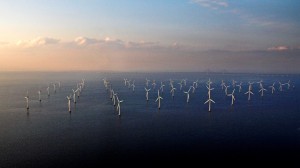Swindon-based energy giant RWE Innogy is under fire today for scrapping plans for a huge wind farm off the north Devon coast.
The German-owned group, which has its UK head office in Swindon, has pulled the plug on the 240-turbine Atlantic Array project, claiming it is uneconomic. 
The scheme, which had not yet received the go-ahead, had attracted widespread criticism, with environmentalists worried about its impact on marine wildlife in the Bristol Channel.
RWE Innogy said it was “not the right time” for the project.
The group’s director of offshore wind Paul Cowling said: “This is not a decision we have taken lightly, however given the technological challenges and market conditions, now is not the right time for RWE to continue to progress with this project.”
The Atlantic Array was planned in an area of 200 sq km (77 sq miles) about 16.5km (10 miles) from the north Devon coast, 22.5km (14 miles) from South Wales coast and 13.5km (8 miles) from Lundy Island nature reserve.
The turbines would have been 220m (720ft) tall and capable of producing 1,200 megawatts of electricity – enough for up to 900,000 homes, the developer has said.
Friends of the Earth's head of campaigns Andrew Pendleton told the BBC: “The Government’s wanton green-bashing is starting to cost jobs and threaten the future security of our energy supply.
“The UK has some of the finest offshore clean energy resources in the world and harnessing it is becoming cheaper.
“But anti-green ideology at the heart of the coalition is sending the development of world-beating clean power into reverse.”
Head of renewable energy capital at property experts Jones Lang LaSalle, Dane Wilkins, said: “The UK government has pinned many of its energy policy hopes on the success of these offshore wind farms to meet its clean energy target of sourcing 15% of the country’s power from renewable energy projects by 2020.
“The scrapping of this project puts a serious dent in these plans and will ultimately limit the South West’s potential to benefit from the booming green energy sector in the form of both investment and jobs.
“This is the first cancellation of one of the large offshore wind projects and comes in the face of increasing political uncertainty surrounding renewable energy support levels.”














